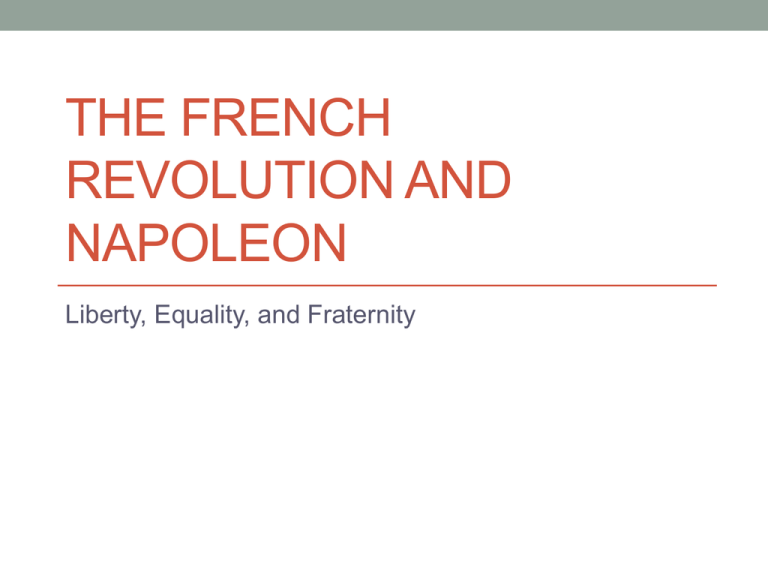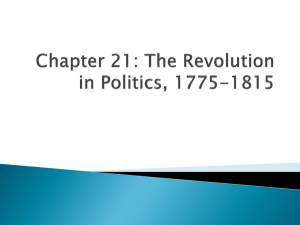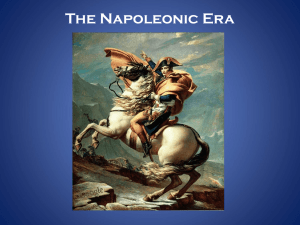File
advertisement

THE FRENCH REVOLUTION AND NAPOLEON Liberty, Equality, and Fraternity Background to the Revolution • 1789 was important in both French and American history. The same year that George Washington became the first President under the new Constitution, France’s Revolution began. Causes of the French Revolution: The Three Estates • The First Estate • Roman Catholic Clergy – between ½ and 1 % of the population, owning 10 % of the land. The clergy were exempt from the taille (land tax). Upper Clergy – archbishops, bishops, abbots Lower Clergy – local priests The tithe, 10 % of people’s earnings, went to the church. Causes of the French Revolution: The Three Estates (continued) • The Second Estate Nobility or Aristocrats – Around 2 % of the population which owned 25 % of the land. Held all the high posts in the government and the military. Paid little or no taxes. Collected feudal dues from the peasants Causes of the French Revolution: The Three Estates (continued) • The Third Estate 97% of the population which owned 40 % of the land. Three Groups Peasants – lived on farms Artisans, shopkeepers, and wage earners. Bourgeoisie – middle class factory owners, traders, and businessmen. No political rights. Important positions in the government and church went to aristocrats. Had to pay tithes to the Church, feudal dues, fees, and fines to the nobles, and the taille (land tax) to the king, even though many did not have enough to eat. Causes of the French Revolution: Absolute Monarchy King Louis XVI and Queen Marie Antoinette The Nobility wanted to increase their power and limit the king like Britain had done. Causes of the French Revolution: Debt War debts, including the American Revolution Lavish spending on court luxuries while 1/3 of the population was in severe poverty. In 1786, banks began to refuse to loan the government money because they were not being repaid. The Estates-General • To raise money, Louis XVI called a meeting of the Estates-General. This council had not been called since 1614, 175 years earlier. • The Assembly was divided by estates with each of the three estates getting one vote. The Estates-General (continued) • The third estate wanted each member to have a vote, but that the king blocked idea. • The third estate began calling itself the National Assembly. When it was locked out by the other two estates, it went across the street to an indoor tennis court. • The Tennis Court Oath was an agreement to meet until a new constitution was written. The Estates-General (continued) • The people of Paris stormed the Bastille, a royal armory and prison. • The king raised an army to put down the assembly. The Estates-General (continued) • Local rebellions broke out throughout France with peasants against the nobility. Many nobles fled to other countries and began asking other kings to invade France to restore order. • Émigrés to Austria and Prussia. • Throughout the country militias formed to train in case foreigners attacked France. The National Assembly • The Declaration of the Rights of Man and the Citizen Freedom and equal rights for all men Access to public office based on talent not ancestry End clergy and nobility exemptions to taxes All citizens to have a right in taking part in the making of the law Freedom of speech and press The National Assembly • Louis XVI refused to accept the laws of the National Assembly. Thousands of Parisian women armed with pitchforks, swords, and muskets went to the palace at Versailles and met with the king to tell him about their starving children. • These women brought the king to Paris. He gave the women wagons of food from the royal storehouses, but was put in house arrest in Paris. The National Assembly • The National Assembly seized Church lands. Church officials were to be elected and paid by the state. • The National Assembly wrote the Constitution of 1791 creating a constitutional monarchy and a legislative Assembly. .The Legislative Assembly • Most of the people opposed the Legislative Assembly from the beginning. • Only men over 25 who paid a certain amount of tax could vote. • Other kings, mainly in Austria and Prussia, threatened to help King Louis XVI. • France declared war on Austria; in the beginning, they lost several battles. • Radicals calling themselves the sans-culottes (“without fine clothes”) attacked the Legislative Assembly and captured the king. The National Convention • The sans-culottes set up the National Convention in 1792 to write another constitution. They wanted to end the monarchy and establish a republic. • King Louis XVI was beheaded using the guillotine because it is humane. The National Convention (continued) • The National Convention had a de- christianization policy. • The word “Saint” was removed from street names and churches closed. • Notre Dame was rededicated as a “temple of reason.” • Spain, Portugal, and Britain form a coalition to invade France. The Reign of Terror • The Committee of Public Safety is • • • • formed, headed by Maximilien Robespierre. Robespierre said anyone not submitting to the government would be executed. Close to 40,000 people were sent to the guillotine during this time. France’s armies began to change. With huge numbers drafted into the army, the French defeated the coalition against them. Once the foreign threat was gone, Robespierre was guillotined. The Directory • The new constitution of 1795 set up the Directory, a five man executive committee with a legislature called the Council of 500 and The Council of Elders (250 members). • The Directory was very corrupt. • In 1799, the Directory was overthrown in a coup d’etat (sudden overthrow of the government) by General Napoleon Bonaparte. The Rise of Napoleon • Napoleon was born in 1769 on the island of Corsica in the Mediterranean. • He went to a military school in France, and in 1785 became a lieutenant in the French army. • By age 25, Napoleon had risen to the rank of general. • In 1797, he won a series of victories in Italy. • He fought the British in Egypt, losing the war, but taking the Rosetta Stone to France. The Rise of Napoleon • In 1799, the led the coup d’etat and became the first consul of the three man consulate that ruled France. • In 1802, Napoleon made himself consul for life. • In 1804, Napoleon was crowned Emperor Napoleon I. The Rule of Napoleon • Napoleon made peace with the Church. • In 1801, he recognized Catholicism as the religion of most of the French people, though he did not give the land of the Church back. The Napoleonic Code. • Before Napoleon, France had over 300 separate legal systems. He unified these into one code. Equality before the law Right to choose a profession – economic freedom Religious toleration End of serfdom and feudalism –nobility and clergy lost their special privileges. The Fall of Napoleon Napoleon could not defeat Britain because of its navy. Napoleon sells the Louisiana Purchase (1803) to the US to have the money to build up his army and navy. The British defeated the French-Spanish fleet at the Battle of Trafalgar (1805). The Fall of Napoleon Napoleon starts the Continental System to try to hurt Britain’s economy. No country in Napoleon’s empire could trade with the British. However, British trade with the US, Latin America, and the Middle East actually improved the British economy instead of hurting. The Fall of Napoleon In 1812, Russia resumed trade with Great Britain angering Napoleon. Napoleon invaded Russia with 600,000 men. The Russians adopted a scorched Earth policy. They would fight to slow the French down then destroy anything the French might use as they retreated. The Russians even burned Moscow before the French entered the city. The Fall of Napoleon Napoleon began to retreat from Moscow in October, but got caught in an early winter storm. By the time Napoleon got back to France, his army was reduced to 40,000. The Fall of Napoleon Other European nations rose up and attacked France. Paris was captured in 1814, and Napoleon was exiled to the island of Elba in the Mediterranean. Louis XVIII, brother of Louis XVI became the king of France. The Fall of Napoleon Napoleon escapes Elba. The army forsakes the king and sides with Napoleon. Napoleon was defeated by British and Prussian forces under command of the Duke of Wellington at Waterloo, Belgium in 1815. The Fall of Napoleon Napoleon was exiled to the island of St. Helena in the south Atlantic where he remained until he died in 1821.









